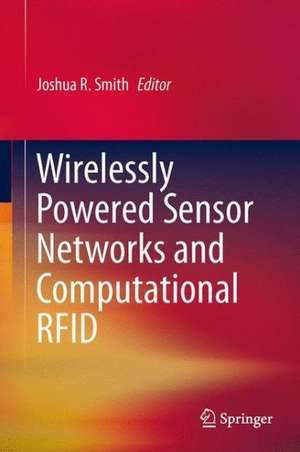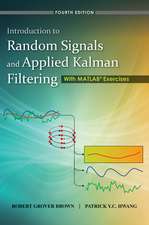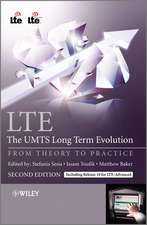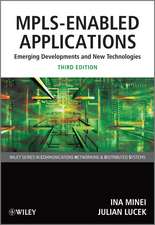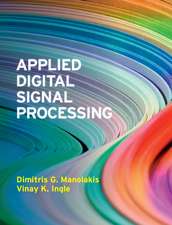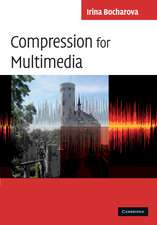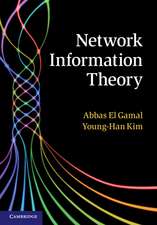Wirelessly Powered Sensor Networks and Computational RFID
Editat de Joshua R. Smithen Limba Engleză Hardback – 21 feb 2013
This book is a collection of key papers on RF-powered sensing and computing systems including the WISP. Several of the papers grew out of the WISP Challenge, a program in which Intel Corporation donated WISPs to academic applicants who proposed compelling WISP-based projects. The book also includes papers presented at the first WISP Summit, a workshop held in Berkeley, CA in association with the ACM Sensys conference, as well as other relevant papers.
The book provides a window into the fascinating new world of wirelessly powered sensing and computing.
| Toate formatele și edițiile | Preț | Express |
|---|---|---|
| Paperback (1) | 640.06 lei 6-8 săpt. | |
| Springer – 23 aug 2016 | 640.06 lei 6-8 săpt. | |
| Hardback (1) | 641.71 lei 6-8 săpt. | |
| Springer – 21 feb 2013 | 641.71 lei 6-8 săpt. |
Preț: 641.71 lei
Preț vechi: 754.95 lei
-15% Nou
Puncte Express: 963
Preț estimativ în valută:
122.81€ • 133.35$ • 103.16£
122.81€ • 133.35$ • 103.16£
Carte tipărită la comandă
Livrare economică 22 aprilie-06 mai
Preluare comenzi: 021 569.72.76
Specificații
ISBN-13: 9781441961655
ISBN-10: 1441961658
Pagini: 271
Ilustrații: XIV, 271 p.
Dimensiuni: 155 x 235 x 22 mm
Greutate: 0.45 kg
Ediția:2013
Editura: Springer
Colecția Springer
Locul publicării:New York, NY, United States
ISBN-10: 1441961658
Pagini: 271
Ilustrații: XIV, 271 p.
Dimensiuni: 155 x 235 x 22 mm
Greutate: 0.45 kg
Ediția:2013
Editura: Springer
Colecția Springer
Locul publicării:New York, NY, United States
Public țintă
ResearchCuprins
Preface.- Range Scaling of Wirelessly Powered Sensor Systems.- History of the WISP Program.- The Wireless Identification and Sensing Platform.- System-On-Chip WISP: A 9 micro-Amp, Addressable Gen 2 Sensor Tag for BioSignal Acquisition.- Battery-less wireless sensors based on low power UHF RFID tags.- Passive RFID-based Wake-up Radios for Wireless Sensor Networks.- BAT: Backscatter Anything-to-Tag Communication.- Implementing the Gen 2 MAC on the Intel WISP.- WISP Monitoring and Debugging.- Maximalist Cryptography and Computation on the WISP UHF RFID Tag.- Security Enhanced WISPs: Implementation Challenges.- Power Optimized Waveforms That Enhance the Range of Energy Harvesting Sensors.- Wireless Ambient Radio Power.- Powering a VAD using the portable FREED System.- PORFIDO: Using neutrino telescopes and RFID to gather oceanographic data.- RFID-Vox: a Tribute to Leon Theremin.
Notă biografică
Joshua R. Smith is Associate Professor in the Departments of Computer Science and Engineering (CSE) and Electrical Engineering (EE) at the University of Washington in Seattle, where he leads the Sensor Systems research group. Prior to joining UW in 2011, he was Principal Engineer at Intel Labs Seattle from 2004 – 2010. At Intel he led several wireless power projects, including WISP, WARP, and WREL. While a graduate student at MIT, he co-invented an electric-field-based automotive passenger sensing system that has been incorporated in every Honda car made since 2000. He received Ph.D. and S.M. degrees from the MIT Media Lab’s Physics and Media Group, and M.A. in Physics from Cambridge University, and B.A. degrees in Computer Science and Philosophy from Williams College.
Textul de pe ultima copertă
The Wireless Identification and Sensing Platform (WISP) is the first of a new class of RF-powered sensing and computing systems. Rather than being powered by batteries, these sensor systems are powered by radio waves that are either deliberately broadcast or ambient. Enabled by ongoing exponential improvements in the energy efficiency of microelectronics, RF-powered sensing and computing is rapidly moving along a trajectory from impossible (in the recent past), to feasible (today), toward practical and commonplace (in the near future).
This book is a collection of key papers on RF-powered sensing and computing systems including the WISP. Several of the papers grew out of the WISP Challenge, a program in which Intel Corporation donated WISPs to academic applicants who proposed compelling WISP-based projects. The book also includes papers presented at the first WISP Summit, a workshop held in Berkeley, CA in association with the ACM Sensys conference, as well as other relevant papers.
The book provides a window into the fascinating new world of wirelessly powered sensing and computing.
This book is a collection of key papers on RF-powered sensing and computing systems including the WISP. Several of the papers grew out of the WISP Challenge, a program in which Intel Corporation donated WISPs to academic applicants who proposed compelling WISP-based projects. The book also includes papers presented at the first WISP Summit, a workshop held in Berkeley, CA in association with the ACM Sensys conference, as well as other relevant papers.
The book provides a window into the fascinating new world of wirelessly powered sensing and computing.
Caracteristici
A comprehensive tour of the latest research in wirelessly powered sensor networks, RFID, and power harvesting Includes an overview, interpretation, context, and guide posts for future research directions A collection of several years of relevant work Includes supplementary material: sn.pub/extras
